Andrew Davis, conductor and scholar, led
opera and life with an imperishable twinkle
Remembrance: Davis was Lyric’s Opera’s longtime music director, an old friend of the Chicago Symphony and a man of ‘good wit.’
By Lawrence B. Johnson
The last time I interviewed conductor Andrew Davis, in 2021, he was as I shall always think of him: soft-spoken, thoughtful, articulate, self-effacing, an undemonstrative intellectual with a wry spirit and a mischievous twinkle in his eyes that lit up his whole being.
Of the many testimonials and tributes I’ve read about Davis since his death from leukemia on April 20 at age 80, the one I think he would have liked best was the succinct observation of Jeff Alexander, president of the Chicago Symphony Orchestra, that the British-born conductor possessed “good wit.” Indeed, he was notorious for it. Andrew’s droll, agile turn of mind was, like the wide command of his musicianship, the reflection of profound brilliance.
He was Andrew, by the bye. He was Sir Andrew, of course, but he didn’t expect to be called that. Nor Maestro. He was one down-to-earth soul who lived for the art of music and whose wingspan and enthusiasm took in the opera world from “La bohème” – “I don’t think there’s a spare note in it” – to Alban Berg’s expressionist “Lulu,” which Davis often said might be his favorite opera.
In the middle of it all, the bedrock for him as for many another opera conductor, was Wagner’s tetralogy “The Ring of the Nibelungen.” The carrot (his word) that lured Davis to Lyric Opera of Chicago in 2000, to begin a two-decade tenure as music director, was the promise of a “Ring” cycle, which was indeed consummated in 2005. And he was three-quarters of the way through another go at it in 2020 when the Covid crisis brought the project to a sudden stop with the final opera, “Götterdämmerung,” in rehearsal and commencement of three cycles through “Ring” just weeks away. The resonance of that disappointment was still in the air when we sat down to talk a year later.
“It was a great tragedy, losing the ‘Ring,’” Davis said. “It had been a great journey, getting the production team together, deciding on the look. I loved the whole design thing of being able to see the apparatus of the theater from the audience. And the concept was all about the characters, not the set. And just like that, it was all gone.
“But still, these last 20 years have been a wonderful period of my life. I was able to do a complete ‘Ring’ cycle in 2005, and there have been other special things – (Berg’s) ‘Wozzeck,’ but especially ‘Lulu,’ which I’ve been enamored of since I was 18.”
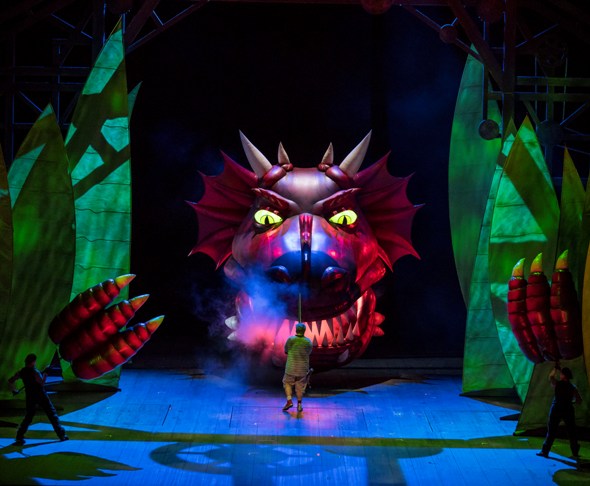
A scene from Wagner’s ‘Siegfried,’ the third opera in Lyric’s ill-starred production of a ‘Ring’ cycle. (Todd Rosenberg photo)
Davis rattled off other composers whose operas had stuck with him in fond Lyric memories: Massenet, Britten, Tippett, the world premiere of Jimmy López’s “Bel Canto,” about a band of terrorists In South America who take hostage a group of party-goers at a grand soiree. In 20 seasons, Davis plowed a lot of opera ground. But post-Lyric, he intended to store that plow in favor of a gardening trowel. “Opera is time-consuming, and I want to spend a lot of time not conducting,” he said. “I’m sure I’ll be back to conduct at Lyric, but I’m not doing any opera anywhere else.”
Of the deep bond between Davis and Lyric, Anthony Freud, the company’s general director, said: “He was a true artistic partner to me and a shining light for so many of us. We will miss his incredible artistry, his extraordinary wisdom, his irrepressible humor, his unfettered zest for life, and his devotion to the arts and the humanities. We have all been incredibly fortunate to have had Sir Andrew as a constant inspiration for so many years,”
Davis did return to the Lyric pit for a January 2023 production of Humperdinck’s “Hansel and Gretel,” his last opera there. But he also made another appearance, for a single performance of Beethoven’s Ninth Symphony in April 2022 – an aggressive, probing and clear account that served as a compelling reminder of Davis’ distinguished and far-ranging career as an orchestra conductor. He held posts as principal conductor or music director with the Glyndebourne Festival Orchestra, Melbourne Symphony Orchestra, Toronto Symphony Orchestra, and the Royal Liverpool Philharmonic. Davis studied at King’s College, Cambridge, where he was an organ scholar before studying conducting. In 1992, he was made a Commander of the British Empire, and in 1999 he was designated a Knight Bachelor in the New Year Honors List.
Though Davis’ long service with Lyric made company and conductor nearly synonymous to a generation of Chicago music lovers, he also developed an even longer relationship with the Chicago Symphony and, separately, with Alexander, its president.
“I had the honor of working with him while serving as general manager of the Cincinnati Symphony Orchestra in the 1980s and ’90s, as he often appeared there as guest conductor,” Alexander said. “Getting to know him was a genuine pleasure. How fortunate we have been at the Chicago Symphony Orchestra to have enjoyed Sir Andrew’s music-making, jovial nature, and good wit for nearly 50 years, most recently conducting his orchestration of Handel’s ‘Messiah’ this past December. The world has lost a great artist, true gentleman, and dear friend. Our memories of his concerts, kind nature, and that ever-present twinkle in his eye will live with us forever.”
At the end of my chat with David three years ago, he mentioned that, besides gardening, he would beguile his retirement days with the continuation of a modest project begun in the idleness of the pandemic: a verse translation into English of Virgil’s Latin epic “The Aeneid,” a tale of the founding of Rome.
“In high school, I studied Latin and Greek,” the conductor said. “‘The Aeneid’ consists of 12 books – 9,896 lines. I’ve completed 11 books, translating into iambic pentameter. It’s been very rewarding, and not totally unlike what I usually do, only looking for color in words instead of sound, to capture the emotional climaxes, the power and the grandeur. Virgil’s work was commissioned by Augustus to celebrate Rome’s history, but there are parts where Virgil is quite sarcastic about that.” He smiled, with his eyes.
Ave atque vale. Hail, Andrew, and farewell.

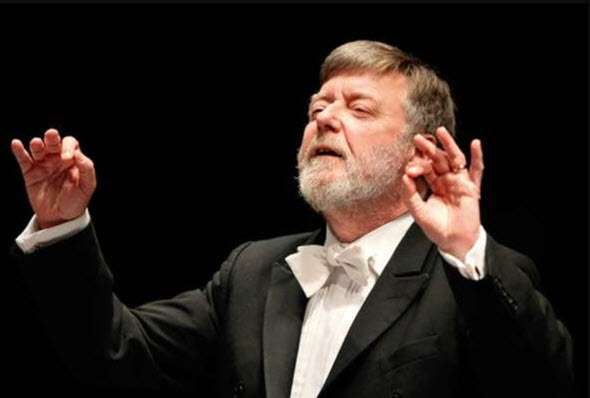
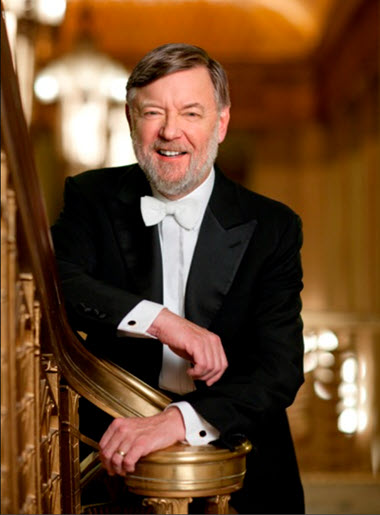
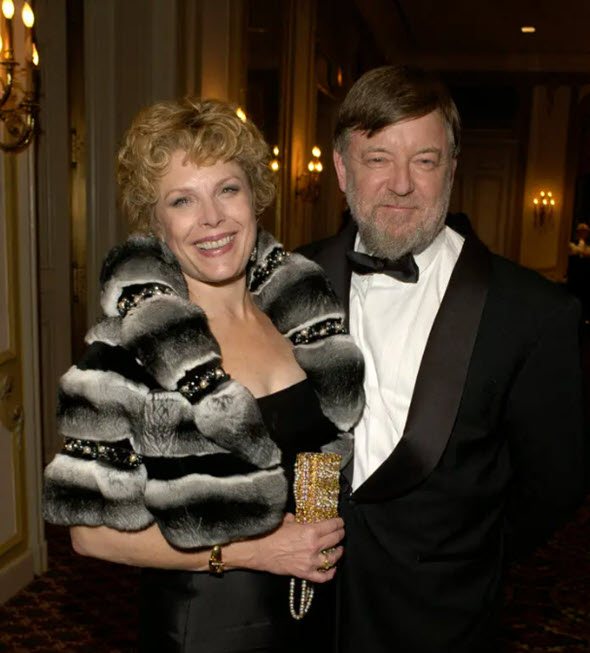
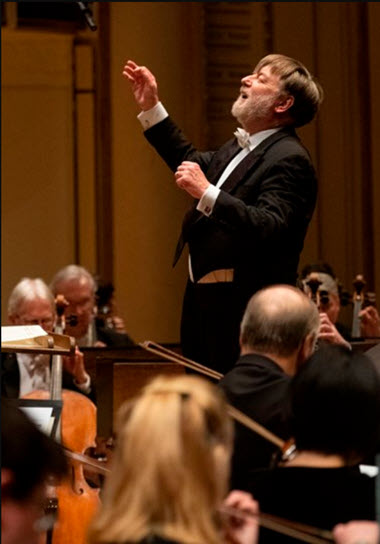

A very good read about a man who made the Chicago music scene much richer. Thank you